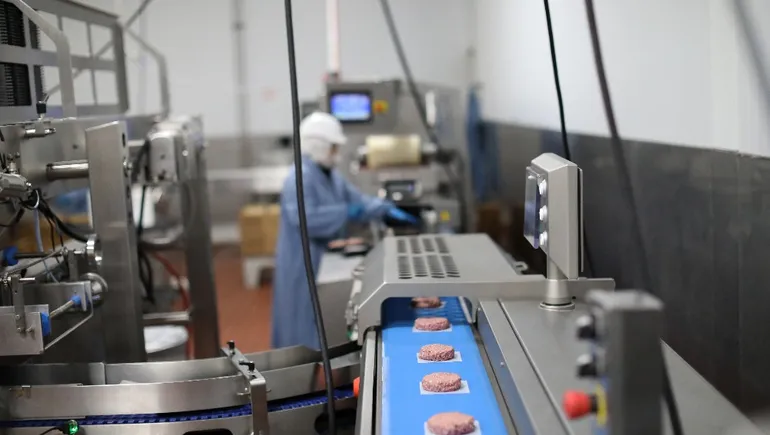Beyond Meat CEO sees 2024 as a ‘pivotal year’ despite grim Q1 results

Dive Brief:
- The plant-based pioneer reported an 18% decline in revenue from the same period last year. Demand in the U.S. for its burgers, steak and chicken also fell despite discounted prices.
- Beyond Meat CEO Ethan Brown remained optimistic about the company’s future during an earnings call on Wednesday. “We believe that 2024 is a pivotal year for change in progress,” he said, adding that the company plans to roll out another heart-healthy product later this year.
- Brown said the latest iteration of its signature product, the Beyond IV Burger, is rolling out in stores nationwide. He said the item addresses concerns by consumers over the health claims of its products. But some experts counter that health claims alone might not be a reason for lower intake by consumers.
Dive Insight:
Brown ended Wednesday’s call by noting that Beyond “began the year making solid strides along our 2024 strategy and correspondingly, our path to sustainable operations and a return to growth.”
Despite the CEO’s optimistic outlook, Beyond had struggled as consumer interest in plant-based meats has waned. Revenue during the first three months of 2024 fell to $75.6 million, marking the eighth straight quarter of declines.
Retail and food service sales in the U.S. were down for the company 16% compared to the same period last year, while international retail sales fell 12%.
Beyond also is rethinking its pricing strategy, with the newly launched products being positioned as a premium offering. After discounting prices on its chicken, beef and steak products, the company is shifting strategies. To reflect using higher-quality ingredients such as avocado oil and protein from fava beans, its products will now come at a higher price tag than ever before.
“We tend to agree with the pricing strategy, but it raises the risks of exacerbating market share losses to its biggest competitor, Impossible,” TD Cowen analysts said.
Impossible — which just launched its chicken products in Whole Foods — claims it’s outperforming the category and is positioned as the fastest-growing plant-based brand in the U.S.
The shift for Beyond comes as consumers have purchased fewer plant-based products due to their high prices.
Plant-based meat and seafood sales declined in 2023 for the second year in a row, according to the Good Food Institute’s State of the Industry report. Higher prices compared to conventional products were cited as the main reason.
First-time buyers of plant-based meats are prioritizing taste, availability, quality and health benefits, according to the report.
Beyond executives are confident the company’s new marketing strategy, which prioritizes the health of its new products, will jumpstart sales. Analysts remain skeptical.
“The health and wellness marketing sounds dubious to us given that most consumers cite taste as the leading barrier to adopting the category rather than health,” said TD Cowen analysts in a statement sent to Food Dive.
During the past year, Beyond made changes to its business to improve its bottom line and position it for growth, such as cutting jobs and pulling back on the launch of new products.
In February, the company said it would implement “a steep reduction in our operating costs,” increase prices for some products and “right-size” its production footprint.
“Our overarching goal is to restore margins to previous levels achieved in 2019 and 2020 over time,” Brown said about the company’s new pricing strategy.
Despite the optimism, the first quarter showed headwinds facing the plant-based sector — cash burn, financial right-sizing and raising product awareness.
The company’s cash rate was $33 million during the quarter, Peter Saleh, BTIG managing director and restaurant analyst, said in a research note.
“We expect Beyond Meat will still need to raise additional capital this year, with any equity raise being significantly dilutive and debt likely carrying an expensive interest rate,” Saleh said.
Source: fooddive.com

